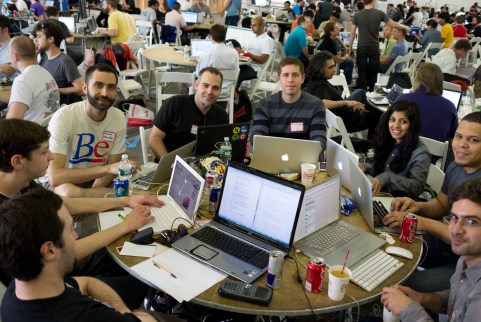Once the sole domain of tech companies and startups, the hackathon has invaded almost every industry. Event planners organise hackathons for different objectives, ranging from recruitment and networking to marketing and education.
The hackathon is an event, usually a competition, for techies that span 2 full days in which software developers, hardware developers, designers and project managers collaborate intensely to develop an innovative project. However, many companies are adapting this format and organising more unconventional hackathons for their own purposes.
1) Non-competitive hackathons
Some hackathon organisers are removing the competitive element to create a more collaborative element while possibly saving money on prizes. It creates a more friendly environment for less experienced participants to join in and learn from more experienced ones. People are more willing to take the time to teach because they are not too preoccupied with winning. In addition, ideas are much more creative as there are tie-ups and cooperation between teams and this leads to more breakthroughs.

However, the drawback is that people tend to work slower and are sometimes less motivated to push themselves to the ultimate limit. Yet, the presentations at the fintech hackathon Hack/Make the Bank 2015 organised at Level 39 still had high quality pitches.
2) Very short hackathons
For the event planners that cannot find a venue for a 2-day hackathon or lack the logistical resources to do so, a short hackathon could just do the trick.
PA Consulting, based in London recently organised a one-hour hackathon. It mainly focused on developing an idea and creating a quick prototype. It served as a great networking session for busy professionals and was awesome for employer branding as people could understand what the company did on a deeper level and forge stronger relationships by working together.
http://hackevents.co/hackathon/united-kingdom/london/714-the-one-hour-hackathon

3) Non-technical hackathons
The most common non-technical hackathon are business hackathons that mainly focus on the ideation, business building processes and the pitch. Code-free hackathons like Protohack are great for generating less technical solutions, while not excluding them entirely. Prototypes however, tend to be less advanced as it’s difficult to build any actual programmes or products without coding experience.

4) Virtual hackathons
Working over the Internet on sharing platforms can also get the job done. The best thing about virtual hackathons is the ability to draw participants from all over the world. However, it is difficult to sustain successful teams as there is too little face-to-face contact and time zone issues.
What all the hackathons have in common is the culture of encouraging innovation, building and breaking things and teamwork. As long as these values are promulgated, the hackathon will be successful whatever form it takes,
Need help planning your next hackathon? Want to reach out to the startup community?
Whether it’s free or paid, EventNook can help you with online event registration, event ticketing and onsite event registration and check-in!
Try it Free for Free events!
